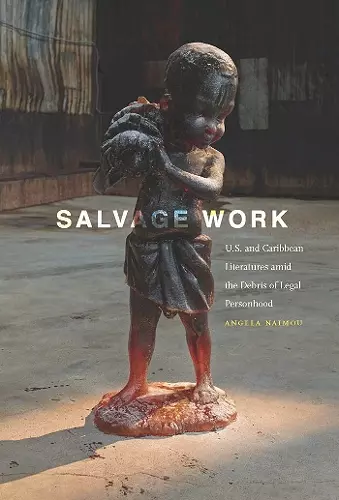Salvage Work
U.S. and Caribbean Literatures amid the Debris of Legal Personhood
Format:Hardback
Publisher:Fordham University Press
Published:1st Apr '15
Currently unavailable, and unfortunately no date known when it will be back

Salvage Work examines contemporary literary responses to the law’s construction of personhood in the Americas. Tracking the extraordinary afterlives of the legal slave personality from the nineteenth century into the twenty-first, Angela Naimou shows the legal slave to be a fractured but generative figure for contemporary legal personhood across categories of race, citizenship, gender, and labor. What emerges is a compelling and original study of how law invents categories of identification and how literature contends with the person as a legal fiction. Through readings of Francisco Goldman’s The Ordinary Seaman, Edwidge Danticat’s Krik?Krak!, Rosario Ferre’s Sweet Diamond Dust (Maldito Amor), Gayl Jones’s Song for Anninho and Mosquito, and John Edgar Wideman’s Fanon, Naimou shows how literary engagements with legal personhood reconfigure formal narrative conventions in Black Atlantic historiography, the immigrant novel, the anticolonial romance, the trope of the talking book, and the bildungsroman.
Revealing links between colonial, civic, slave, labor, immigration, and penal law, Salvage Work reframes debates over civil and human rights by revealing the shared hemispheric histories and effects of legal personhood across seemingly disparate identities—including the human and the corporate person, the political refugee and the economic migrant, and the stateless person and the citizen.
In depicting the material remains of the legal slave personality in the de-industrialized neoliberal era, these literary texts develop a salvage aesthetic that invites us to rethink our political and aesthetic imagination of personhood. Questioning liberal frameworks for civil and human rights as well as what Naimou calls death-bound theories of personhood—in which forms of human life are primarily described as wasted, disposable, bare, or dead in law—Salvage Work thus responds to critical discussions of biopolitics and neoliberal globalization by exploring the potential for contemporary literature to reclaim the individual from the legal regimes that have marked her.
"Salvage Work is a thoughtful and timely exploration of the historical, ideological, and political significance of legal personhood in very contemporary fiction. Salvage Work is a wonderful incorporation of a deep body of legal history ... moving away from purely 'cultural' definitions and recognizable political trajectories and toward a complicated reading of identity." -- -Samantha Pinto Georgetown University "Salvage Work is a unique and exciting study that engages with a variety of disciplines, including American studies, Caribbean studies, and postcolonial studies. This is a beautifully written book that offers astute, nuanced close readings of the literary works that expose the critical intersections between law, empire, personhood, and literature." -- -April Shemak Sam Houston State University "Angela Naimou's superbly written Salvage Work is one of the smartest responses to Giorgio Agamben's 'death-bound theories of legal personhood.' Rather than take the refugee as the singular figure for theorizing the limits of sovereignty and the subject of law, Naimou studies the disruptions to a liberal rights paradigm through her focus on equally troubling cases of exceptional personhood in the figures of, among others, the slave, the disappeared, the corporation, the sailor, the fugitive, and the fetus. The legal and political insights are all the more powerful because they emerge from meticulous close readings of U.S. and Caribbean fiction, reminding us of just how much the world needs humanities-based and literary thinking if we are to tackle the most important problems of our time in their full weight and complexity." -- -Joseph R. Slaughter Columbia University
- Winner of Association for the Study of the Arts of the Present Book Prize 2016
- Commended for William Sanders Scarborough Prize 2016
ISBN: 9780823264766
Dimensions: unknown
Weight: unknown
304 pages